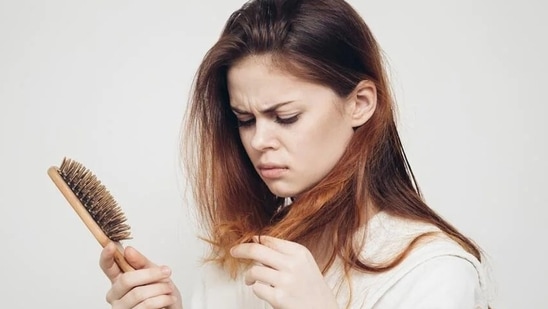
Stress to thyroid issues: What your hair fall patterns say about your body and health problems
6 months ago | 5 Views
Hair fall is often embarrassing and leads to a panic-like situation in many people so, read on as we highlight various factors that can impact your hair and cause that concerning hair fall. Going through a sudden hair fall can be an overwhelming journey that can negatively affect one's overall well-being.
In an interview with HT Lifestyle, Dr Rinky Kapoor, Consultant Dermatologist, Cosmetic Dermatologist and Dermato-Surgeon at The Esthetic Clinics in Mumbai, shared, “Hair loss is often seen as a minor inconvenience or cosmetic issue but it can be more than that. Most of the time hair loss can significantly hint at various clues and provide valuable insight into your overall physical and psychological health.”

She added, “Understanding the correlation between these hair fall patterns and health conditions becomes crucial to combat this serious problem. One needs to closely examine these hair fall patterns to know what their body might be trying to say about their physical health. This can help the doctor curate customised treatment plans to mitigate hair fall as well as several underlying health conditions.”
The correlation between hair fall patterns and health problems
- Alopecia areata: It is a type of autoimmune disease that leads to hair loss in patches. A person with this condition may not only experience hair loss from the scalp but also the eyebrows and eyelashes. One should immediately consult a doctor for effective solutions. Unfortunately, this condition cannot be cured but with proactive care and constant efforts, the hair might regrow.
- Telogen effluvium: This condition is also known as stress-induced hair loss. One can experience hair problems like thinning of the hair and shedding due to several physiological and physical stresses. Various factors can contribute to this condition. This may include conditions like thyroid disorder, undergoing certain surgery, pregnancy, childbirth, nutritional deficiency, sudden weight loss and excessive stress. It is a temporary condition that may get better with the time.

- Androgenetic alopecia: The most common cause of hair loss in women and men. It is also known as hereditary alopecia. This particular condition is significantly linked with genetics and androgen resulting in hair loss. In men, the hair loss may be more visible in the crown area while in women the hair starts to become thinner as time passes by.
- Thyroid disease: Health conditions like thyroid can negatively worsen your hair health. People diagnosed with thyroid can experience hair problems like brittle, dull, coarse, and dry hair. Over time it may also make your scalp dry and itchy which can be overwhelming.
- Nutritional deficiency: If you are picky about their food habits then this habit of yours can be harmful to your hair. Diets that do not contain enough nutrients like vitamins, minerals, lean protein, iron and zinc can lead to malnutrition and excessive hair shedding.
Read Also: Say goodbye to sagging skin: This skincare solution is the new anti-ageing must-have





















